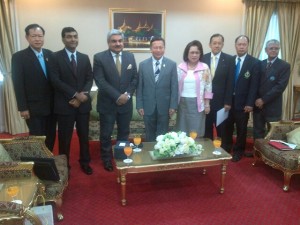
27 Jun, 2013
Indian Ambassador Meets Thai Tourism Minister on Crime, Complaints
Bangkok – Indian Ambassador to Thailand Anil Wadhwa called on Minister of Tourism and Sports Mr. Somsak Phurisisak on June 24 to discuss issues ranging from rising incidents of crime against tourists to complaints about harassment. Although not directed specifically at Indian visitors, the issues reflect the growing social and legal downsides of Thailand’s record-breaking visitor arrivals and the management challenges now facing Thai authorities.
The ambassador said he had taken up four areas of concern with the minister: Rip-offs by jet-ski operators, the US$500 cash required as proof-of-funds for the visa on arrival facilities; the Customs scrutiny of the jewellery and gold brought in by guests attending the many Indian weddings being held in Thailand, and necklace-snatching by motorcyclists.

Indian Ambassador Anil Wadhwa (third from left) with the Thai Tourism Minister (fourth left) and other diplomats and officials of the Ministry of Tourism & Sports and Tourism Authority of Thailand.
The Ambassador said there had been at least 30 necklace-snatching incidents in the last 4 to 5 months, mostly in Bangkok’s main Sukhumvit area. He said the embassy had informed the Indian travel agents associations about this in anticipation that they would alert their clients.
To facilitate access to the US$500 (or equivalent) for visa-on-arrival, he said Indian side had proposed that the airport authorities put an ATM machine inside the arrival area where it can be accessed by the applicants. He said the embassy has received several complaints from visitors who were sent back after being unable to show proof of funds, and unable to access any means of getting the money as there are no ATMs or foreign exchange counters before the immigration desks.
However, Mr Wadhwa said he was told by the tourism minister that the Thai authorities intend to very soon drop the US$500 cash requirement for the visa on arrival application process. He also quoted the minister as saying that Customs authorities have agreed to be more lenient with the wedding guests bringing along their private jewellery.
He said the Minister also told him that security authorities are looking into the jetski rackets, which is the same response that was given to a group of Ambassadors from European countries when they visited Phuket recently.
The chain-snatching has become a Bangkok-wide problem. City police have been placed signs at various key intersections warning all pedestrians as well as bus passengers about chain- and bag-snatchers. Mr Wadhwa said it was important for Indian travel agents to inform their clients of this menace.
Importantly, the concerns raised by the ambassador highlight the growing side-effects of Thailand’s tourism boom and the pressing challenges that the entire Thai travel & tourism industry now faces in managing the numbers.
Visitors from other key markets such as Russia and China are also reporting problems. Numerous media reports have emerged about problems between Russian visitors and suppliers of local services, such as taxi drivers, in Phuket. Many parts of Pattaya, another popular beach resort with the Russian visitors, are dominated entirely by Russian signage.
In North Thailand, a sudden influx of Chinese visitors has created social frictions, mostly related to bad behaviour of the Chinese tourists. In many hotels and restaurants, signs are coming up clearly saying they will deny entry to either/or Indians, Chinese, Russian and Middle Eastern visitors.
India, China and Russia are all generating more than one million annual visitors to Thailand, and continuing to grow strongly. The marketing efforts are all producing results in terms of raising the head-count but a new set of challenges are now emerging.
Mr Wadhwa said he planned to hold a follow-up meeting with the minister in about two months to discuss progress.



Liked this article? Share it!